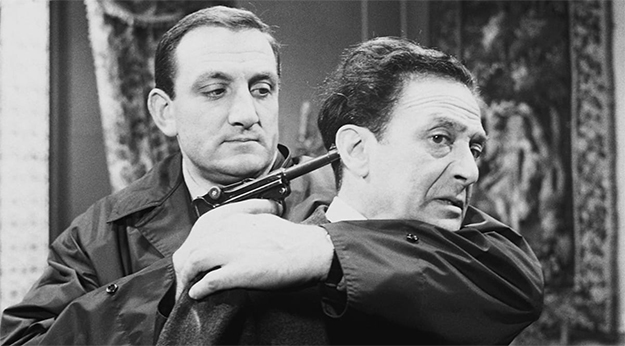The Ephemeral Worlds of Claude Sautet

Classe Tous Risques (Claude Sautet,
I had a very special, very personal, very privileged relationship with Claude Sautet. I felt a shock when I discovered his Classe Tous Risques (60), and it was on this film that I wrote my first review. It was a short article, as the editor had requested, and doubtless superficial—I was young—but laudatory. It ended with this sentence: “I’ve heard them say that Classe Tous Risques is a ‘B’ movie, but better ‘B’ like Boetticher than ‘A’ like Allegret.” It’s a sentence I now find unnecessarily mean to Allegret.
It is not by accident that I referred to Boetticher, the director of Seven Men From Now. In Classe Tous Risques, Sautet shared with him the same elliptical sensibility, the same narrative clarity, the same affection for strong feelings and marginal characters. Like Jacques Tourneur, his approach—secret and insidious rather than showy or obvious—was revolutionary, and he reinvented a seemingly outmoded genre. After that long, almost Bressonian, opening sequence, with the magnificent shots of a station, the sublime voiceover, the heist in the streets of Milan, it became impossible to film these kinds of events, the movements of these kinds of characters—even their way of walking up the street—in quite the same way as before.
That article was followed by my first interview with Sautet. He spoke about the influences that had marked his film, including his love of Westerns like Rio Bravo, and said that he had instructed Jean-Paul Belmondo (the co-star of Classe Tous Risques) to see Seven Men From Now. It was “the beginning of a beautiful friendship,” which remained unclouded and unwavering and ended only with his death.
He was, with Jean-Pierre Melville, my godfather in cinema, helping me, taking me under his wing, even convincing my parents to let me choose this profession rather than political science. I was, together with Pierre Rissient, his defender and press agent, and, after becoming a director myself, I had him read my scripts and showed him my rough cuts. Sautet was the greatest script doctor and fix-it editor in French cinema. Everyone, including Truffaut, consulted him, and his reactions were always stimulating. He would instantly put his finger on what wasn’t working and immediately find a solution. He improved, repaired, patched up a very large number of French films and saved several from disaster. Jean Gabin often called him because “the screenplay needed a dessert”—a very good image. And Sautet invented all kinds of desserts.
This rigor, this synthetical mind which didn’t suppress emotions—quite the contrary—gave Sautet’s work its strength, its originality. The policier structure of Max et les Ferrailleurs (71), one of his greatest achievements, is worthy of Fritz Lang. Sautet (with the help of the novelist and co-screenwriter Claude Néron) manages to combine a clinical look at a police conspiracy with a real compassion for the perpetrators and the victims of said conspiracy, especially the character played beautifully by Romy Schneider. We also find this combination of trenchant rigor and compassion in A Heart in Winter (92), A Few Days with Me (88), and Mado (76). And it permeates Classe Tous Risques, the first third of The Dictator’s Guns (65), and the revised cut of Garçon! (83), in which he was able to eliminate the superficial motivations initially imposed by his star, Yves Montand.
Sautet was passionate about music. You should have heard him dissect, analyze, sing a Bach prelude, “Manteca” by Dizzy Gillespie, a piece of Mingus or Ravel. He literally lived harmonic changes and rhythmic modulations, and you could see how this fed the choral, contrapuntal structure of his films: think César and Rosalie (72), Mado, A Few Days with Me, or Vincent, François, Paul and the Others (74). He feared cute details, pretty moments. He was very much against the virtuosity, the embellishments of an Art Tatum, and much preferred the elliptical, deep (and very innovative) pianistic sensitivity of Duke Ellington.
From his past as a children’s educator, and his brief flirtation with the Communist Party, he was inclined to anchor his films in a very specific reality which he described with precision, and without preaching or presupposed ideologies. Facts, nothing but facts. The world—not the small world of Paris, for Claude was a man and a filmmaker from the suburbs—is present in his films. You feel it shuddering at the door, beating behind the characters (even if they live in beautiful country houses). Some of them suffer social transformations, collide with the crises that affect certain professions, especially artisans and small businesses of the sort that provide the human background of his films. Sautet sensed the arrival of the current crisis. The economy carries a real weight in his films, which were early to grasp the unraveling of our social fabric and the rise of unemployment.
Behind the trips in cars, lunches in cafés, you can feel the cracks, the disappearance of a certain France that had emerged from the Occupation and liberation, as described so well by Jacques Becker in his masterpieces Antoine et Antoinette, Rendez-vous de juillet, and Falbalas. A world where being a worker or craftsman made sense. Under a polished and charming “bourgeois” surface (which fooled some people), Sautet’s approach and the mood of his films are in fact rather dark and somber. It’s not by accident that Sautet was less productive in his later years: the land that inspired him was eroding and he didn’t want to confront ghosts.







